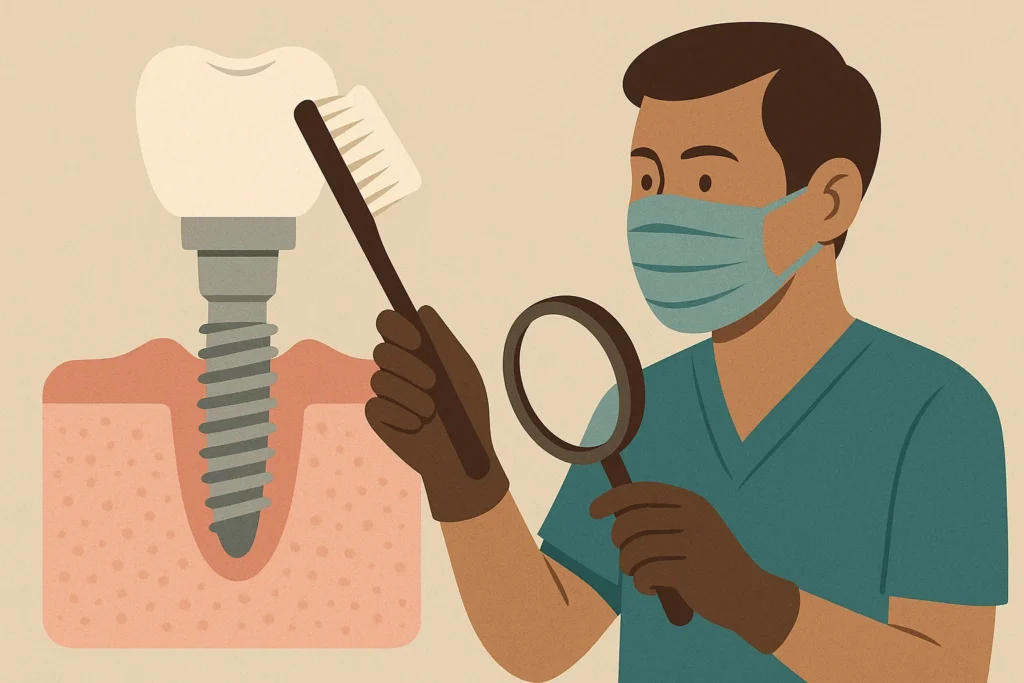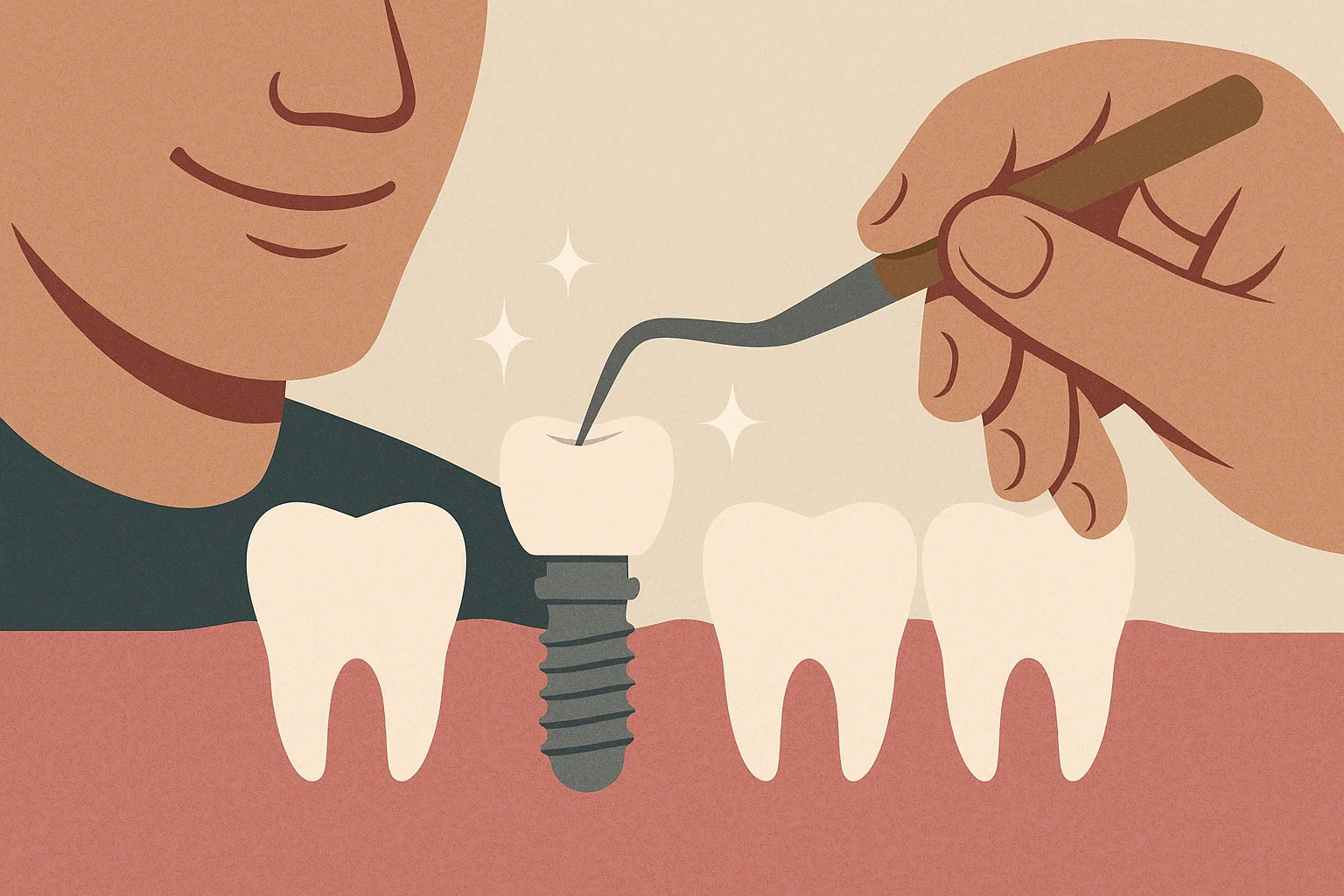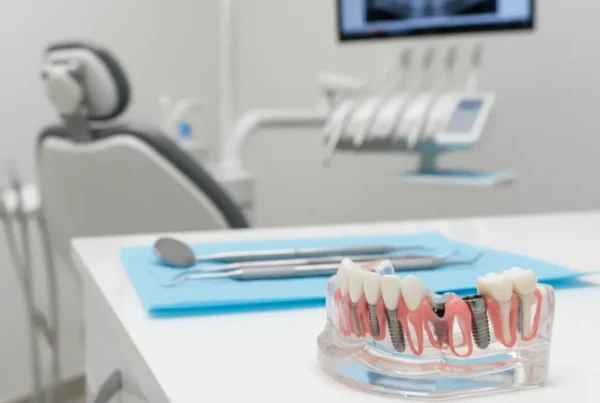Dental implants are often hailed as a long-term solution for tooth loss, but they require ongoing care to truly deliver on that promise. These titanium or ceramic posts may not decay like natural teeth, but they are vulnerable to infection and mechanical failure if not properly maintained. Peri-implantitis—a condition involving inflammation and bone loss around the implant—is one of the most common causes of implant failure. Fortunately, it’s also highly preventable with the right daily habits and professional care.
Failing to follow a proper maintenance routine can result in serious health and financial consequences. An untreated infection could mean losing the implant, requiring costly surgery or bone grafting to correct. It could also jeopardize surrounding teeth and lead to further complications. At Grand Prairie Family Dental, we take a proactive approach by helping patients protect their investment with comprehensive education, regular follow-ups, and a care plan tailored to their unique needs.
Daily Oral Hygiene for Implant Health
Your daily home care routine is the first line of defense when it comes to maintaining the health of your dental implants. While implants themselves cannot develop cavities, the tissues and bone that support them can become inflamed or infected without proper cleaning. The goal is to control plaque and bacteria at the gumline to prevent complications like peri-implant mucositis or peri-implantitis.
Effective brushing, flossing, and the use of adjunctive tools all play a critical role. Patients should pay particular attention to cleaning around the abutment (where the crown connects to the implant), as this area is especially prone to plaque accumulation. The right tools and techniques can help you maintain a clean and healthy environment around your implants.
Recommended home care tools include:
- Soft-bristled or electric toothbrushes: Use gentle, circular motions around the implant to remove plaque without irritating the gums.
- Implant-specific floss or unwaxed dental tape: These are less likely to shred or get stuck and are safe for use around abutments.
- Interdental brushes or rubber top stimulators: Perfect for hard-to-reach areas and beneficial for patients with multiple implants.
- Water flossers: These are highly effective for flushing debris from around the implant and reducing inflammation.
- Alcohol-free antimicrobial mouthwash: Helps minimize bacterial load and keeps the soft tissue healthy.
Creating a routine that includes these tools twice daily can significantly extend the life of your dental implants. Our dental team is always happy to demonstrate the proper techniques during your visit.
Professional Care and Regular Checkups
Even the best home care routine needs to be supplemented with professional oversight. Just as natural teeth benefit from biannual cleanings, dental implants require regular monitoring to remain healthy and stable. During your maintenance visits, we check the surrounding gum tissue, measure bone levels, and look for any signs of early complications that may not yet cause symptoms.
The frequency of these visits can vary depending on your oral health history and risk factors. While most patients can maintain a healthy schedule with checkups every six months, those with a history of gum disease or complex restorations may need to come in every three to four months. At Grand Prairie Family Dental, we create a maintenance schedule that works for your lifestyle and health needs.
During an implant maintenance appointment, you can expect:
- Thorough cleaning: Using instruments that are safe for implant surfaces, such as plastic or titanium scalers.
- Soft tissue evaluation: Checking for signs of inflammation, bleeding, or pocket formation around the implant.
- Radiographs (X-rays): Taken periodically to monitor bone stability and ensure osseointegration remains intact.
- Assessment of bite and prosthetic fit: To confirm the crown or bridge remains stable and functional.
- Review of oral hygiene practices: Customized coaching and updates based on your current condition.
These visits are vital not just for early detection of issues but also for reinforcing good habits. It’s an opportunity to ask questions, adjust your care plan, and make sure you’re on the right path for long-term implant success.

Lifestyle Choices That Support Implant Longevity
The way you live plays a significant role in how long your dental implants last. Beyond brushing and flossing, certain daily choices can either strengthen or undermine the health of your implants. Smoking, poor diet, or stress-induced grinding can place undue pressure on your dental work and increase the risk of complications.
Making smart lifestyle adjustments helps reduce inflammation, supports healing, and enhances your body’s ability to maintain the implant-bone connection. At Grand Prairie Family Dental, we take the time to educate patients on how habits like sleep, diet, and stress management affect not just your oral health—but your overall well-being.
Supportive habits include:
- Eating a balanced diet: Foods rich in calcium, vitamin D, and antioxidants support bone density and gum health.
- Avoiding hard foods and bad habits: Ice, hard candy, pens, or fingernails can damage both the crown and implant.
- Limiting sugar and processed carbs: Reduces the risk of soft tissue inflammation and bacterial overgrowth.
- Staying hydrated: Saliva helps neutralize acid and naturally cleans the mouth.
- Quitting smoking: Tobacco use is one of the leading risk factors for implant failure.
If you grind your teeth at night (bruxism), we may recommend a custom nightguard to protect your implant from undue pressure. These small adjustments can make a big difference in the life span of your dental restoration.
Recognizing and Responding to Implant Problems
Dental implants are highly successful, but they’re not invincible. Like any medical device, they can develop problems—especially when early warning signs are overlooked. That’s why it’s so important to be aware of symptoms that could signal trouble and know when to act.
Early detection can often mean the difference between a minor adjustment and a failed implant. Many issues are easy to resolve if caught quickly, so never assume discomfort is something to “just deal with.” Our team at Grand Prairie Family Dental offers same-day emergency visits and comprehensive diagnostics to handle implant concerns swiftly and effectively.
Common warning signs of implant problems include:
- Red, swollen, or bleeding gums near the implant
- Persistent pain or sensitivity, especially during chewing
- Loosening of the implant or attached crown
- Visible gum recession or exposure of metal components
- Unusual taste, pus, or odor, which may indicate infection
If any of these symptoms occur, contact us right away. Ignoring them can lead to bone loss or the need for removal and replacement. Our goal is to protect your investment and get your smile back to full health with minimal intervention.
Personalized Maintenance at Grand Prairie Family Dental
At Grand Prairie Family Dental, we don’t believe in one-size-fits-all dentistry—especially when it comes to implants. Each patient has a unique anatomy, lifestyle, and medical background that must be considered when developing a long-term maintenance plan. Whether you’re young and active or managing a chronic condition, we design care routines that reflect your reality.
We begin by identifying your individual risk factors—such as smoking, diabetes, or periodontal history—and tailoring a maintenance protocol that aligns with your goals. From appointment frequency to home hygiene tools, we ensure you’re fully supported at every step. Our bilingual team also provides instruction in both English and Spanish, making education accessible to all.
What makes our maintenance programs unique:
- Customized checkup schedules: Adjusted based on healing patterns and ongoing risk assessments
- Hands-on education: Including live demonstrations and printed guides to take home
- Flexible scheduling: Early morning, lunchtime, and weekend appointments available
- Transparent pricing: No surprise costs; we explain everything upfront and offer payment options
Our patients love knowing they’re not alone in their journey. We’re here not just to place implants, but to ensure they thrive. Whether you’ve had your implant for six months or 10 years, our team is ready to help you protect and maintain your smile.
We believe everyone deserves a complete, healthy smile without financial stress. We understand that dental implants are an investment, which is why Dr. Behrooz Khademazad offers personalized treatment plans and financing options.
Here’s how we do it:
- Comprehensive Evaluation: We assess your oral health and discuss your smile goals.
- Transparent Pricing: We provide a detailed breakdown of costs with no hidden fees.
- Flexible Financing: We offer various payment plans to fit your budget.
So, schedule your implant consultation with Dr. Khademazad today. Stop hiding your smile or struggling with ill-fitting dentures and instead enjoy the confidence and comfort of a permanent, natural-looking solution.
FAQs
How often should I get my dental implants professionally checked?
We recommend cleanings and evaluations every 3–6 months, depending on your oral health and risk level. High-risk patients may benefit from more frequent visits.
What’s the best way to floss around dental implants?
Use unwaxed floss, implant-specific tape, or a water flosser. Focus on cleaning under the abutment and along the gumline without applying too much force.
Can implants really last a lifetime?
Yes—with proper care. That includes excellent hygiene, professional maintenance, and healthy lifestyle choices. Most implants last 20+ years, and many last a lifetime.
Related Services






